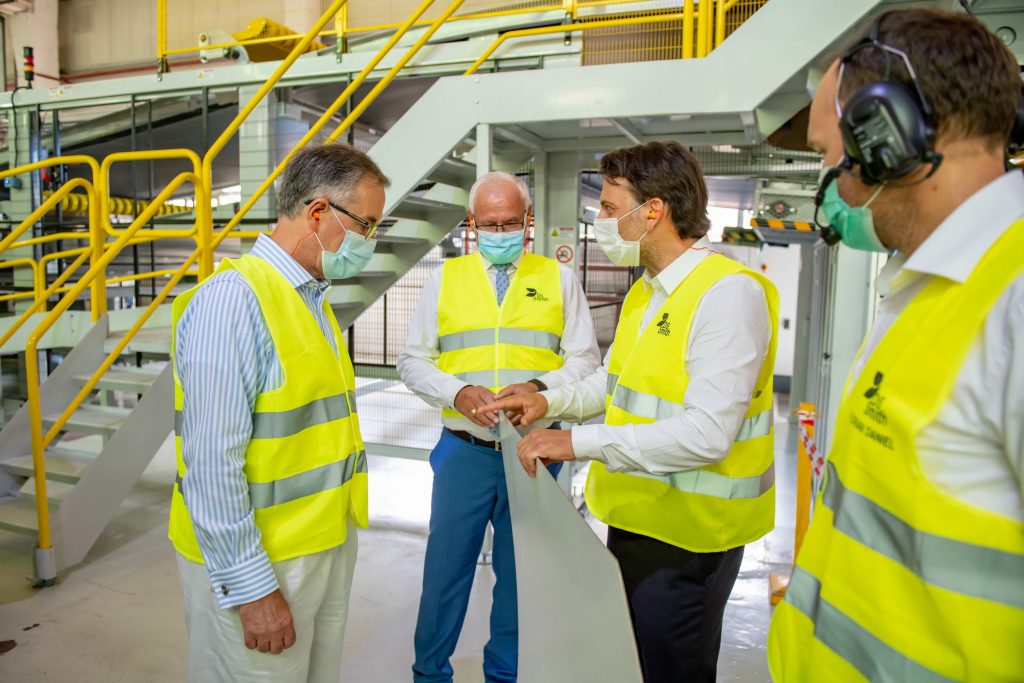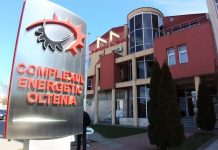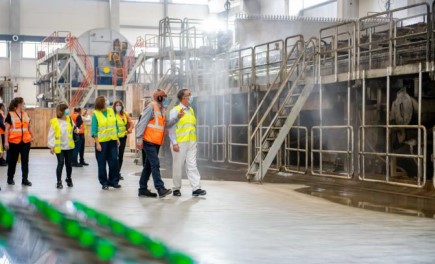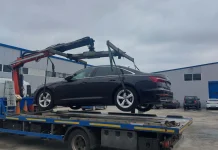Romania has one of the worst recycling rates in the European Union. But one company has created a successful business out of waste paper in Romania which it recycles and turns into packaging and ships around the country.
British investor DS Smith is one of the world’s leading sustainable packaging companies although not a household name in Romania. I visited two units in Transylvania last week that form the backbone of the country’s paper recycling and packaging industry.
GIANT ‘TOILET ROLLS’
The DS Smith paper mill in the onetime industrial town of Zarnesti recycles ton upon ton of waste paper around the clock, transforming it into endless sheets of paper which are the color of manila envelopes. The paper ends up on reels that resemble giant toilet rolls and each weigh 2 tons.
The mill was established in the Transylvanian region in 1852 and nationalized in 1948 when the communists swept to power. Since 2018, it has been part of DS Smith portfolio.
“Sustainability is at the heart of our paper processing business,” says Marius Juncanariu, director of DS Smith Zarnesti.
He said the company “preserved .. the valuable paper making tradition of our region.”
“We are proud to have this rich history as a solid foundation and will continue to work, bringing our contribution to the economic development of our region.”
“Box to box can be done in 14 days” Juncanariu says.
The plant consumes an average of 18,500 tons of recycling paper per month. Paper mills are big water consumers and the company is striving to reduce its carbon footprint. It says it recycles 85% of the water it uses.
METAMORPHOSIS OF PAPER
The metamorphosis of messy waste paper to pristine recycled paper is a dramatic and noisy process. Before chemicals and heat are added to the mix, 1% is paper and 99% is water. The paper is mixed with processed water and stirred in steel vats called pulpers and made into a fiber suspension. Impurities are removed using special screens. There are quality control rooms away from the machines where samples are collected to ensure the paper is high quality.
Visitors are given sports shoes and ear plugs to keep out the noise. But nothing can deflect from the high levels of humidity where the paper is being recycled on giant machines longer than a football pitch.
At this point, the paper looks like sheets of liquid cappuccino as it runs relentlessly on the machines at great speed (700 meters a minute, I am told). It is then dried, taken off and rolled onto jumbo reels before being lifted by a crane and cut into smaller rolls. They are labeled and stored in a warehouse.
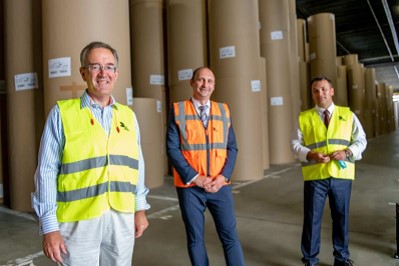
The company strives to make every minute count. The plant operates on five shifts and is open 350 days a year. It can produce 22 to 31 tons of paper per hour.
UK AMBASSADOR’S VISIT
Last week, British Ambassador to Romania, Andrew Noble, visited the company’s production units in Zarnesti and Ghimbav, to see how the waste is turned into recycled paper and then cardboard and cardboard boxes.
He had a guided tour of both sites and an overview of operations, which showcased the latest innovations in paper making and sustainable packaging design and production.
The mayor of Zarnesti, Alexandru Igrișan, and Ghimbav mayor, Dorel Toma, joined the tour, in what may have been a welcome reprieve from signing pieces of paper, to instead, actually getting an insight into the paper and packaging industry.
EUROPEAN OPERATIONS
DS Smith has 14 paper mills in Europe and two in the U.S. It has operations in Britain, Italy, Portugal, Croatia, Romania, Bulgaria, Germany, France, the Netherlands and Spain.
In Romania, it takes 14 days to collect waste paper, to recycle it into good quality paper and deliver goods to packaging customers.
LONDON STOCK EXCHANGE
The company, which is not widely known in Romania, is listed on the London Stock Exchange and is a member of the LTSE 100 index.
It is the largest operation of its kind in Romania and accounts for almost half of the domestic paper demand.
The raw material is fully sourced from recycled paper and the company is a key contributor in helping Romania work towards European targets of recycling paper and cardboard packaging.
IT STARTS WITH OLD PAPER
DS Smith operates what us called “a closed loop recycling process.” Used paper and card are collected from specialized companies (not household waste) and brought to the plant where it is transformed into uniformly light brown thick paper.
Next, it is sent to the DS Smith packaging units in Ghimbav and Timisoara to be turned into cardboard boxes and other packaging products.
Juncanariu said the Ambassador’s visit served to “reconfirm the importance of our activity… We were honored to present him the technology, the local relevance of this facility and our commitment for the future.ˮ
The Ghimbav packaging plant produces corrugated cardboard products needed for the shipment, storage and sales of food and pharmaceuticals as well as other products.
The plant prides itself with its design expertise and has tapped into the growing e-commerce industry to “provide tailor made innovative packaging solutions that minimize environmental impact.”
Visitors also need ear plugs and sport shoes when they step into the Ghimbav plant, but the cardboard and box-making process lack the drama of raw paper manufacturing. Machines are smaller and there are more workers on the factory floor.
Piles of corrugated cardboard look like paper honeycombs, and a machine that flattens cardboard boxes reminds me of train carriages going into a tunnel.
PANDEMIC BUSINESS
The Covid-19 pandemic hasn’t hit the company too badly as cardboard boxes are used for e-commerce and food packaging.
“We are lucky because due to (the fact) we have diversified customers, this helped us balance ourselves,” general manager Remus Craciun said.
Marketing manager Viorica Constantinescu said e-commerce grew by 28% during the pandemic including the pharmacy and food and drinks sector. “We are a bit down, but very decently covered.”
RECYCLED AND RECYCLABLE
Craciun said: “DS Smith is a mature company, with a steady vision on sustainability, yet we are always looking for ways to further improve our products and bring our contribution to shaping a circular economy. “
“We are the cleanest and most sustainable form of packaging there is,” he told universul.net. “It is recycled and recyclable.”
“It is fast and cheap and fully customizable. Absolutely fantastic,” he said. “If you pick it, we are your suppliers.”
DS Smith employs over 650 people in Romania at its recycling head office in Bucharest, two recycling depots in Otopeni and Cluj, the Zarnesti paper mill, packaging production units in Ghimbav and Timișoara and three service centers.
UPBEAT
Ambassador Andrew Noble was upbeat about the company’s activity noting that “sustainability (is) one of the key topics on the agenda of our decade. “
ˮI am extremely proud of DS Smith – the country’s largest recycled paper and packaging manufacturer. The company has been actively engaged in supporting local economies and communities, but also in promoting sustainability.”
“It is a much-needed contribution, given that environment protection is a key topic on today’s international agenda. Based on the discussions we have had, I am confident that the activity carried here will play a significant role in achieving Romania’s recycling targets.”
BACKGROUND
DS Smith has operations on in 37 countries and employs around 30,000 people. It has packaging, recycling and paper divisions.
Its history goes back to the box-making businesses started in the 1940s by the Smith family.
NOT GARBAGE
The company educates young people in Romania, which has one of the lowest recyclying rates in the European Union.
“We do seminars for children to teach them that this is not garbage, this is sustainability,” manager Craciun said.
